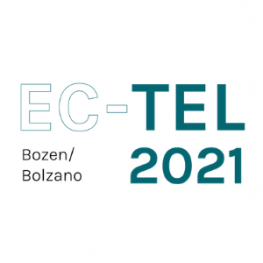Speakers
Jan Schneider
DIPF, GermanyCheng-Yu Chung
Arizona State University, USAWannapon Suraworachet
University College London, UKStart
24/09/2021 - 09:00
End
24/09/2021 - 10:30
Address
Zoom Room 1 @ EC-TEL Gather Town View mapPaper Session 7: Self-Regulated and Self-Directed Learning
Chair:  Sergey Sonovsky
Sergey Sonovsky
Analysis of the “D’oh!” Moments. Physiological Markers of Performance in Cognitive Switching Tasks
Tetiana Buraha[1], Jan Schneider[2], Daniele Di Mitri[2] and Daniel Schiffner[2] [1] Goethe University, Germany [2] DIPF, Germany
Abstract: The link between the body and mind has fascinated philosophers and scientists for ages. The increasing availability of sensor technologies has enabled the possibility to explore this link even deeper, providing some evidence that certain physiological measurements such as galvanic skin response can have in the performance of different learning activities. In this paper, we explore the link between learners’ performance of cognitive tasks and their physiological state with the use of Multimodal Learning Analytics (MMLA). We used MMLA tools and techniques to collect, annotate, and analyse physiological data from 16 participants wearing an Empatica E4 wristband while engaging in task-switching cognitive exercises. The collected data include temperature, blood volume pulse, heart rate variability, galvanic skin response, and screen recording from each participant while performing the exercises. To examine the link between cognitive performance we applied a preliminary qualitative analysis to galvanic skin response and tested different Artificial Intelligence techniques to differentiate between productive and unproductive performance.
📄 Read More: https://link.springer.com/chapter/10.1007/978-3-030-86436-1_11
Examining the Effect of Self-Explanations in Distributed Self-Assessment
Cheng-Yu Chung and I-Han Hsiao Arizona State University, USA
Abstract: Self-assessment is a twofold activity consisting of self-evaluation and self-explanation, which are considered imperative metacognitive strategies in learning science. Although the self-explanation effect has been scaffolded in numerous learning systems, it remains unclear whether the effect can still occur to students in a voluntary setting of learning such as remote learning that requires self-regulation to persist in making progress. Furthermore, it is inconclusive what students’ behavioral patterns can be when they exercise self-evaluation and self-explanation overtime. In this study, we investigate the effectiveness of self-assessment and the embedded self-explanation by dissecting semantic elements in the explanations in a multilevel analysis. The result showed that the low-performing students were challenged by the complexity of topics, which resulted in an increased error rate when they ventured into more learning opportunities. However, the self-explanation effect might occur to them and improved their performances, especially when they reflected on the content of questions that were relevant to the concepts. In summary, this study provides an insight into effective self-assessment. Specifically, it shows that students can potentially improve performances by writing compact and relevant explanations over time.
📄 Read More: https://link.springer.com/chapter/10.1007/978-3-030-86436-1_12
Examining the Relationship Between Reflective Writing Behaviour and Self-regulated Learning Competence: A Time-Series Analysis
Wannapon Suraworachet[1], Cristina Villa-Torrano[2], Qi Zhou[1], Juan I. Asensio-Pérez[2], Yannis Dimitriadis[2] and Mutlu Cukurova[1] [1] UCL Knowledge Lab, University College London, UK [2] GSIC-EMIC Research Group, Universidad de Valladolid, Spain
Abstract: Self-Regulated Learning (SRL) competence is imperative to academic achievement. For reflective academic writing tasks, which are common for university assessments, this is especially the case since students are often required to plan the task independently to be successful. The purpose of the current study was to examine different reflection behaviours of postgraduate students that were required to reflect on individual tasks over a fifteen-week-long higher education course. Forty students participated in a standardised questionnaire at the beginning of the course to assess their SRL competence and then participated in weekly individual reflection tasks on Google Docs. We examined students’ reflective writing behaviours based on time-series and correlation analysis of fine-grained data retrieved from Google Docs. More specifically, reflection behaviours between students with high SRL and low SRL competence were investigated. The results show that students with high SRL competence tend to reflect more frequently and more systematically than students with low SRL competence. Even though no statistically significant difference in academic performance between the two groups was found, there were statistical correlations between academic performance and individual reflective writing behaviours. We conclude the paper with a discussion on the insights into the temporal reflection patterns of different SRL competence student clusters, the impact of these behaviours on students’ academic performance, and potential suggestions for appropriate support for students with different levels of SRL.
📄 Read More: https://link.springer.com/chapter/10.1007/978-3-030-86436-1_13



